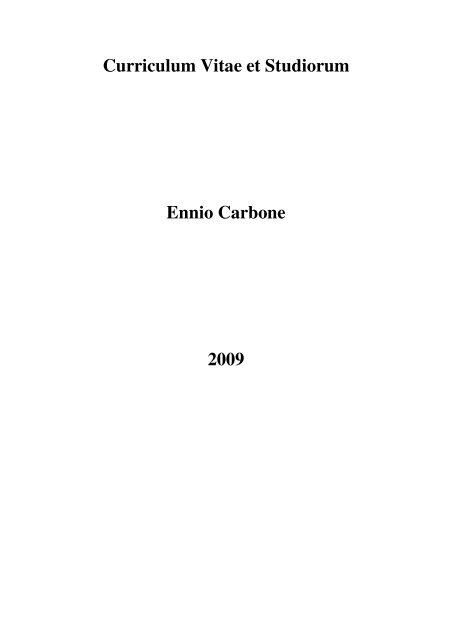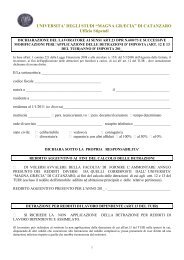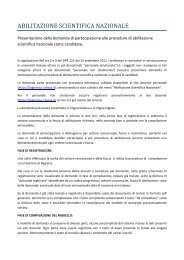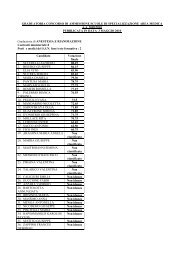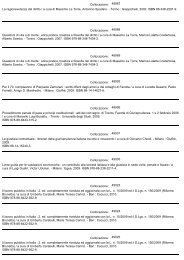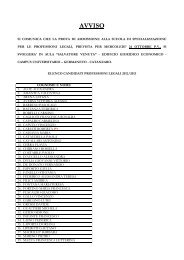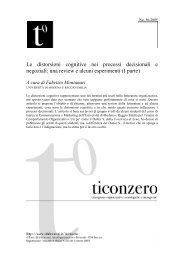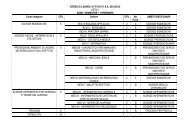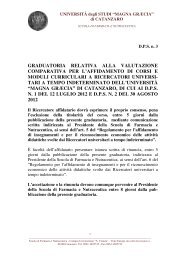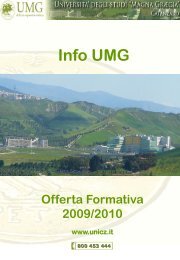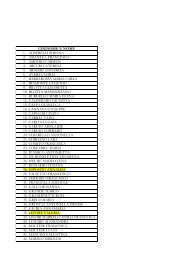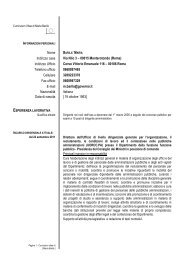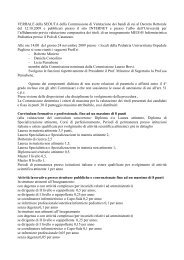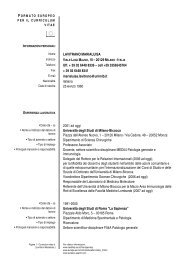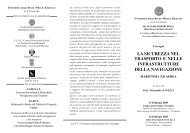Curriculum Vitae et Studiorum Ennio Carbone 2009
Curriculum Vitae et Studiorum Ennio Carbone 2009
Curriculum Vitae et Studiorum Ennio Carbone 2009
You also want an ePaper? Increase the reach of your titles
YUMPU automatically turns print PDFs into web optimized ePapers that Google loves.
<strong>Curriculum</strong> <strong>Vitae</strong> <strong>et</strong> <strong>Studiorum</strong><br />
<strong>Ennio</strong> <strong>Carbone</strong><br />
<strong>2009</strong>
KAROLINSKA INSTITUTET<br />
1) Teaching experience.<br />
PEDAGOGIC PORTFOLIO<br />
1.1) Undergraduate studies:<br />
Sweden 1998. I was coordinating student group work at Karolinska Institut<strong>et</strong><br />
during the Immunogen<strong>et</strong>ic Course for Biomedical science students. In 1999 I was<br />
coordinator of a student group work in the Molecular Immunology Course for<br />
medical students. In 2001 I was co-supervising tog<strong>et</strong>her with Prof Britta Wahren<br />
the master project of Annalinda Hultsrom (Hultström, Anna Linda, Natural killer<br />
cell activity in HIV infection. Handl: Britta Wahren och <strong>Ennio</strong> <strong>Carbone</strong>,<br />
Stockholm 17 april, 2001).<br />
Italy: Since 1987 until 1990 I was engaged in the didactic activity offered by the<br />
Chair of Immunology within the Immunology and Pathology Course for MD<br />
students, University of Naples Federico II directed by Prof S. Zappacosta. From<br />
the 1993 until the 1997 I was supplent Professor of Pathology at the Pharmacy<br />
School University of Naples Federico II Specialization Course in Experimental<br />
Pharmacology directed by Prof R. Di Carlo. Since 2001 to 2006, I was Assistant<br />
Professor at the University of Catanzaro Magna Graecia (UMG) Medical School<br />
and docent of Immunology and Pathology for the Medicine and Surgery Course<br />
Students. Since 2006 I am Associate Professor of Pathology at UMG, resosable<br />
docent for the following courses: Pathology within the Medicine and Surgery<br />
graduation corse, Physiopathology at the Bioengeeniring graduation course,<br />
Immunobiology at the Biotechnology graduation course, Immunology at Nursery<br />
graduation course. Immunology at the International PhD program in Molecular<br />
Oncology Experimental Immunology and development of new Therapy. I was<br />
co-supervisor tog<strong>et</strong>her with Prof S. Zappacosta the following student for the<br />
diploma thesis experimental work : 1990 Dr. A. La Cava, 1999 Dr. A. Ottaiano,<br />
1998 – 1999 Dr. C. Palomba, Dr I. Amendola. 2003 I was supervisor at<br />
University of Catanzaro of the thesis laboratory work of Dr. N. Drmac. 2004 Dr.<br />
MT Fulciniti, 2005 Dr. Tiziana Mandaliti.<br />
1.2) Postgraduate teaching.<br />
Since 2000 I am Faculty member of the: International Experimental Immunology<br />
PhD program (University of Catanzaro Magna Graecia – Karolinska Institut<strong>et</strong>),<br />
and the Molecular Oncology, Immunology and New Therapy Development<br />
(University Magna Graecia, Karolinska Institut<strong>et</strong>, University of Friburg and<br />
Roswell Cancer Park). Within these PhD program tog<strong>et</strong>her with Docent P<strong>et</strong>ter<br />
Höglund (Karolinska Institut<strong>et</strong>) we have organised and directed a Joint Course<br />
(UMG-KI) 2002, 2003, 2005, 2007. The venue of the Course was alternatively<br />
Catanzaro and Stockholm. The 2002-2004 editions were focusing Tumorbiology<br />
with special focus on innate immunological surveillance and immunotherapy of<br />
cancer.Kursnummer (=anmälningskod) 1698. While the 2006 edition was<br />
focusing on Combined anticancer therapy. All the Course organized within the<br />
UMG-KI Joint PhD program have the standard time of 1 week full time course<br />
with 7 lecture two hours each, student group work and with a written final
examination. The student that pass the final examination receive 1 credit (CFU).<br />
This course has been really successful and the last edition (2007) have been held<br />
in Friburg (Germany). The good results obtained with our Joint PhD course is<br />
largely due to the mix b<strong>et</strong>ween basic science and clinical problem. Under this<br />
light I believe that our didactic work is new and original. The faculty of the Joint<br />
PhD Course and program is formed by Docent from both side (UMG and KI).<br />
The Italian PhD student of the UMG-KI international PhD program must spend at<br />
least 1 year in the partner laboratory. Since 2006 international PhD students<br />
trained in Italy are joining the MTC-KI. In particular Dr Kanth Tadepally<br />
have compl<strong>et</strong>ed his PhD period and now have been recruited as postdoc at the<br />
MTC. A second round of PhD students will join the Karolinska Institut<strong>et</strong><br />
starting from September 2008.<br />
Sweden, I was co-supervising two Postdoc; 1997 Dr Cristina Cerboni, 2000 Dr<br />
Louise Berg.<br />
Italy, I have been supervising the 4 year laboratory work of 4 PhD students and<br />
1 Oncology Specialist MD work. The PhD students are: 1993-1997 PhD Jose<br />
Terrazzano, 2003- Dr Lakshamikanth Tadepally, 2005- Dr Talib Hassan Ali,<br />
2006 Rosanna La Rocca, 2006 Mario Galgani, 2006 Dr Shibu Krishnan, 2007<br />
Rossana Talarico. While from the 2001 untill 2003 I was supervising Dr Paola<br />
Neri specialization experimental thesis work. I have organized, lectured and<br />
gived one seminar to the Course on The Molecular Basis of Autoimmune<br />
Diseases and at the International PhD Course in Physiopathology of the<br />
University of Naples Federico II and the International Experimental Immunology<br />
PhD UMG-Catanzaro held in Naples the 10 th of October 2005. Experimental<br />
immunology teaching at the Molecular Oncology, Experimental Immunology,<br />
and Development of new therapy PhD program.<br />
1.3) Continuing and advanced education plus specialist training<br />
a) Time. Seven year Docent of Pathology within the Medicine and Surgery<br />
graduation course (UMG), Seven years Docent of Pathology Nursery School<br />
(UMG), Seven years Docent of the International PhD program in Molecular<br />
Oncology, Experimental Immunology and development of New Therapy. Six<br />
years co-director tog<strong>et</strong>her with Prof P<strong>et</strong>ter Hoglund of the International joint PhD<br />
course UMG-KI. Thirteen years serving as docent of the “Ruggero Ceppellini”<br />
Advanced Immunology School.<br />
The independence level: All the didactic activities are carried out in compl<strong>et</strong>ely<br />
autonomy.<br />
b) Type and vari<strong>et</strong>y. I am lecturing at the Medicine and Surgery graduation<br />
course, Nursery, Biotechnology and Bioengineering and Computer Science<br />
graduation courses (UMG), International PhD Program in Molecular Oncology<br />
and Experimental Immunology (UMG-KI).<br />
I was involved as Docent in the following Advanced Education Course organized<br />
by the Advanced Immunology School “ Ruggero Ceppellini”: Level 1 (MD,<br />
V<strong>et</strong>Sc, Pharmacist) offered by the School:<br />
L'immunità in patologia umana 95-96 Naples, November 1995-March 1996<br />
L'immunità in patologia umana 2002 Naples, November - December 2002.<br />
Level 2 (PhD, Post Doc, Junior and Senior Scientist):<br />
HLA & Tumours Naples, 2-6 December 1996Course held at the Istituto<br />
Nazionale Tumori Fondazione Pascale The Course Directors: S Ferrone
(Valhalla) & C Manzo (Napoli)The Faculty: E <strong>Carbone</strong> (Napoli) - M Colonna<br />
(Basel) - P G Coulie (Louvain) - G B Ferrara (Genova) - S Ferrone (Valhalla) - P<br />
Giacomini (Roma) - J Guardiola (Napoli) - K Kärre (Stockholm) - J Kaufman<br />
(Compton) - R Kiessling (Stockholm) - M Maio (Aviano) - C Manzo (Napoli) - F<br />
M Marincola (B<strong>et</strong>hesda) - L Mor<strong>et</strong>ta (Genova) - L Rivoltini (Milano) - B Seliger<br />
(Mainz) - J Trowsdale (London);<br />
Dendritic Cell PhysiologyPositano, 20-24 May 1999 Course held at the Hotel Le<br />
Agavi The Course Director: P Ricciardi Castagnoli (Milano). The Faculty: S<br />
Amigorena (Paris) - F Brière (Dardilly) - T Brocker (Freiburg) - E <strong>Carbone</strong><br />
(Stockholm) - C G Figdor (Nijmegen) - O J Finn (Pittsburgh) - G Girolomoni<br />
(Roma) - F Granucci (Milano) - A Lanzavecchia (Basel) - C Maliszewski<br />
(Seattle) - E Maraskovsky (Melbourne) - I McConnell (Edinburgh) - A O'Garra<br />
(Palo Alto) - M Rescigno (Milano) - P Ricciardi Castagnoli (Milano) - E Simpson<br />
(London) - S Sozzani (Milano) - R M Steinman (New York).<br />
As Course Director: Innate Immunity in Self and Infectious Non-Self<br />
Recognition Capo Miseno, 10-14 March 2005. Course held at the Hotel Club<br />
Cala Moresca The Course Directors: G J Bancroft (London) – R Biassoni<br />
(Genova) – E <strong>Carbone</strong> (Catanzaro) The Faculty: S Gordon (Oxford) – K Kärre<br />
(Stockholm) – P M Kaye (York) – E A Levashina (Heidelberg & Strasbourg) – M<br />
López-Bot<strong>et</strong> (Barcelona) – A Mantovani (Milano) – L Mor<strong>et</strong>ta (Genova) – A<br />
O’Garra (London) – P Parham (Stanford) – A Santoni (Roma) – J Trowsdale<br />
(Cambridge) – A Velardi (Perugia).<br />
Marie Curie EU supported “NK defence and therapy” Summer School, Bozava,<br />
Dugi otok. 2007.<br />
I have organized, lectured to the Course on The Molecular Basis of Autoimmune<br />
Diseases and at the International PhD Course in Physiopathology of the<br />
University of Naples Federico II and the International Experimental Immunology<br />
PhD UMG-Catanzaro held in Naples the 10 th of October 2005.<br />
Seminars:<br />
1994 Microbiology and Tumorbiology Center (MTC), Karolinska<br />
Institut<strong>et</strong>, Sweden.<br />
1994 Department of Biology University of Roma “La Sapienza”<br />
guest Prof. E. Piccolella<br />
1997 Medical Research Council, Royal Postgraduate Medical School,<br />
Hammersmith Hospital, London UK; guest Prof. E. Simpson<br />
1997 Immunology Department Babraham Institute Cambridge, UK<br />
guest Drs P. Kilshaw e G. Butcher.<br />
1998 MTC Karolinska Institut<strong>et</strong> Stockholm, Sweden
2000 Neuroscience Department Huddinge University Hospital, guest<br />
of Prof. H Blink. Sweden<br />
2000 MTC Karolinska Institut<strong>et</strong>. Stockholm, Sweden.<br />
2001 Department of Immunology, University of Stockholm,<br />
guest Prof. Carmen Fernandez. Stockholm, Sweden.<br />
2003 Chair of Hematology Department of Experimental Medicine.<br />
Naples, guest Prof. B. Rotoli.<br />
2004 Centrum for Infektionsmedicin (CIM) SSF, Huddinge<br />
University Hospital, Huddinge, Sweden guest of Prof. HG<br />
Ljunggren<br />
2005 National Cancer Institut “Fondazione G. Pascale” Naples Guest<br />
Dr. A. Boudillon.<br />
2005 Department of Cellular and Molecular Pathology University of<br />
Naples “Federico II” guest Prof. Enrico Avvedimento.<br />
2006 Microbiology and Tumorbiology Center Karolinska Institut<strong>et</strong>,<br />
guest Maria Joanhsson (immunobiology seminars)<br />
Babraham Institute Cambridge UK<br />
2007 Chairman of the Tumorimmunology Session of the Italian<br />
Immunology Soci<strong>et</strong>y National Congress Trieste.<br />
2008 Max-Delbruck Centrum , Berlin Buch, guest Prof Thomas<br />
Blamkestein.<br />
Tutoring with problem solving learning. MD student of the Pathology course are<br />
organized in study group with the task to enucleate from selected clinical case the<br />
immunological aspect of the disease pathogenesis.<br />
Educational experience can apply to more programmes: MD, Biotechnology,<br />
Bioengeneering and Computer Science, Nursery graduation course. International PhD
program in Molecular Oncology, Experimental Immunology and New Therapy.<br />
Advanced Immunology School “Ruggero Ceppellini”.<br />
Participation in staff exchanges at Karolinska Institut<strong>et</strong> (Sweden) and University of<br />
Catanzaro Magna Graecia (Italy). Within the framework of the Joint International<br />
PhD Program.<br />
c) Examinations. I am responsible for the final evaluation of the knowledge acquired<br />
by MD, Biotechnology, Nursery, Bioengineering and Computer Science<br />
undergraduate students by oral examination. All the educational activity within the<br />
postgraduate courses are ending in the studying group oral presentation, where the<br />
new knowledge acquired is evaluated.<br />
d) Evaluation. The oral examination is based on a discussion of the lectures topic,<br />
with special emphasis on evaluation of the student capability to extend and deepen the<br />
knowledge on a given topic by literature search.<br />
e) Other supervision/ mentoring. Sweden, I was co-supervising two Postdoc; 1997 Dr<br />
Cristina Cerboni, 2000 Dr Louise Berg.<br />
Italy, I have been supervising the 4 year laboratory work of 4 PhD students and 1<br />
Oncology Specialist MD work. The PhD students are: 1993-1997 PhD Jose<br />
Terrazzano, 2003- Dr Lakshamikanth Tadepally, 2005- Dr Talib Hassan Ali, 2006<br />
Rosanna La Rocca, 2006 Mario Galgani, 2006 Dr Shibu Krishnan, 2007 Rossana<br />
Talarico.<br />
From the 2001 untill 2003 I was supervising MD, Dr Paola Neri Oncology<br />
Specialization experimental thesis work. Experimental immunology teaching at the<br />
Molecular Oncology, Experimental Immunology, and Development of new therapy<br />
PhD program.<br />
1.4) Formal Pedagogical experience.<br />
Comp<strong>et</strong>ence as a research fellow (“docent”): Not available in Italy.<br />
1.5) Undergraduate course administration.<br />
Experience within undergraduate courses,<br />
Course organiser: MD graduation program, Pathology-Immunology course.<br />
Biotechnology graduation program, Immunobiology Course<br />
Bioengineering Informatic graduation program, Physiopathology Course<br />
Nursery graduation program, Immunology.<br />
Course organiser: Joint Course (UMG-KI) 2002, 2003, 2005, 2007. The venue of the<br />
Course was alternatively Catanzaro and Stockholm. Each edition ten Karolinska<br />
Institut<strong>et</strong> PhD student places were offered the participating students were selected<br />
accordingly with their research project. A total of 40 students have taken part to this<br />
Course. The 2002-2004 editions were focusing Kursnummer (=anmälningskod)<br />
1698.<br />
Admissions to undergraduate programmes and research schools.
Member of the Committee for the admission to the Medicine and Surgery School<br />
University of Catanzaro “Magna Graecia” UMG.<br />
Member of the Committee for the recruitment of PhD students in the International<br />
Joint PhD program in Molecular Oncology, Experimental Immunology and<br />
Development of New Therapy.<br />
Globalisation have been taken in the shape of the International PhD program where a<br />
number of slot for PhD student are dedicated to Indian and middle east researcher.<br />
Since 2007 Member of the University of Catanzaro “Magna Graecia” Committee for<br />
the international student exchange program<br />
Since 2007 Member of the Medicine and Surgery Medical School International<br />
Committee<br />
1.6) Compilation of teaching material.<br />
The teaching material is composed by power point presentation and original scientific<br />
paper that are distributed before the lecture. All the didactic material are<br />
downloadable from the website: http://www.unicz.it/immunology/<br />
The material is compiled in compl<strong>et</strong>e autonomy<br />
1.7) Pedagogical research and development work.<br />
One Leonardo da Vinci-EU supported project have been submitted to the Commission<br />
for funding. This project aim to strength the didactic cooperation b<strong>et</strong>ween the UMG<br />
and Karolinska Institute collaboration in the undergraduate studies. This project aim<br />
to bring undergraduate or recently graduate MD, Biotechnology students to<br />
Microbiology and Tumorbiology Center for 6 months-1 year stage with financial<br />
support from the EU. The didactic activities will be strongly complemented with<br />
laboratory work at the Karolinska Institut<strong>et</strong>.<br />
The needs to bring tog<strong>et</strong>her the theory provided by frontal lecturing with lab work is<br />
required to finalize the students formation to the new technological acquisition in the<br />
different field.<br />
1.8) Honours and assessments of pedagogical work.<br />
Assessment of pedagogical work on the basis of comments of directors of studies see<br />
attachment.<br />
1.9) Self evaluation of pedagogical efforts and assessment of pedagogical skills<br />
within basic undergraduate education.<br />
The characteristic of the didactic activity carried so far have been: high interactivity<br />
b<strong>et</strong>ween docent and the students, direct involvement of the student in the course<br />
activity with the organization of study group, and literature search activities ending up<br />
in a oral presentation. Finalization of the study to future professional activity. The<br />
MD student are requested to use during the course and the final examination the new<br />
knowledge acquired to decipher the molecular pathogenesis of the disease and the link<br />
with the clinic semeiotic. For the biotechnology student the update on the new<br />
available technology in the development of new drugs or research tools are highlight
in the lectures. The Courses and lectures are complemented by extra lectures held by<br />
expert (PhD students) of a given topic or invited speakers.<br />
The didactic materials are constantly updated. The lecture contents using as source<br />
recent (not older than 3 years) state of the art review published on leading journal<br />
(Nature, Annu Rev Immunol, Current Opinion in Immunology <strong>et</strong>c).
1.1) Scientific production:<br />
1.1.1) Summary of all original paper.<br />
KAROLINSKA INSTITUTET<br />
SCIENTIFIC PORTFOLIO<br />
1) La Rocca R, Fulciniti M, Lakshmikanth T, Mesuraca M, Ali TH, Mazzei V,<br />
Amodio N, Catalano L, Rotoli B, Ouerfelli O, Grieco M, Gull<strong>et</strong>ta E, Bond HM,<br />
Morrone G, Ferrone S, <strong>Carbone</strong> E. Early hematopoi<strong>et</strong>ic zinc finger protein<br />
prevents tumor cell recognition by natural killer cells. J Immunol. <strong>2009</strong> Apr<br />
15;182(8):4529-37.<br />
2) Lakshmikanth T, Burke S, Ali TH, Kimpfler S, Ursini F, Ruggeri L, Capanni<br />
M, Umansky V, Paschen A, Sucker A, Pende D, Groh V, Biassoni R, Höglund<br />
P, Kato M, Shibuya K, Schadendorf D, Anichini A, Ferrone S, Velardi A,<br />
Kärre K, Shibuya A, <strong>Carbone</strong>* E, Colucci* F. NCRs and DNAM-1 mediate<br />
NK cell recognition and lysis of human and mouse melanoma cell lines in<br />
vitro and in vivo. J Clin Invest. <strong>2009</strong> Apr 6. pii: 36022.<br />
3) Terrazzano G, Sica M, Gianfrani C, Mazzarella G, Maurano F, De Giulio B, de<br />
Saint-Mezard S, Zanzi D, Maiuri L, Londei M, Jabri B, Troncone R, Auricchio<br />
S, Zappacosta S, <strong>Carbone</strong> E. Gliadin regulates the NK-dendritic cell crosstalk<br />
by HLA-E surface stabilization. J Immunol. 2007 Jul 1;179(1):372-81.<br />
4) Markasz L, Stuber G, Vanherberghen B, Flaberg E, Olah E, <strong>Carbone</strong> E,<br />
Eksborg S, Klein E, Skribek H, Szekely L. Effect of frequently used<br />
chemotherapeutic drugs on the cytotoxic activity of human natural killer<br />
cells. Mol Cancer Ther. 2007 Feb;6(2):644-54.<br />
5) Wagner CS, Riise GC, Bergstrom T, Karre K, <strong>Carbone</strong> E, Berg L. Increased<br />
Expression of Leukocyte Ig-Like Receptor-1 and Activating Role of UL18<br />
in the Response to Cytomegalovirus Infection. J Immunol. 2007 Mar<br />
15;178(6):3536-43.<br />
6) Cerboni C, Achour A, Warnmark A, Mousavi-Jazi M, Sandalova T, Hsu ML,<br />
Cosman D, Karre K, <strong>Carbone</strong> E. Spontaneous mutations in the human CMV<br />
HLA class I homologue UL18 affect its binding to the inhibitory receptor LIR-<br />
1/ILT2/CD85j. Eur J Immunol. 2006 Mar;36(3):732-41.<br />
7) <strong>Carbone</strong>, E., Neri, P., Mesuraca, M., Fulciniti, M.T., Otsuki, T., Pende, D.,<br />
Groh, V., Spies, T., Pollio, G., Cosman, D., Catalano, L., Tassone, P. Rotoli,<br />
B., and Venuta , S. HLA class I, NKG2D and Natural Cytotoxicity Receptors<br />
regulate Multiple Myeloma cell recognition by Natural Killer cells. Blood<br />
2005:105.<br />
8) Terrazzano G, Pisanti S, Grimaldi S, Sica M, Fontana S, <strong>Carbone</strong> E,<br />
Zappacosta S, Ruggiero G. Interaction b<strong>et</strong>ween natural killer and dendritic<br />
cells: the role of CD40, CD80 and major histocompatibility complex class i
molecules in cytotoxicity induction and interferon-gamma production.<br />
Scand J Immunol. 2004 Apr;59(4):356-62.<br />
9) Hultstrom AL, Bratt G, Cosma A, Erfle V, Wahren B, <strong>Carbone</strong> E.<br />
Autologous cytotoxicity of natural killer cells derived from HIV-infected<br />
patients. Immunol L<strong>et</strong>t. 2004 Feb 15;91(2-3):155-8.<br />
10) Cerboni C, Oberg L, Terrazzano G, Zappacosta S, <strong>Carbone</strong> E, Karre K.<br />
Proliferative and cytotoxic response of human natural killer cells exposed to<br />
transporter associated with antigen-processing-deficient cells.<br />
Scand J Immunol. 2004 Feb;59(2):159-67.<br />
11) Bond* HM, Mesuraca* M, <strong>Carbone</strong> E, Bonelli P, Agosti V, Amodio N, De<br />
Rosa G, Di Nicola M, Gianni AM, Moore MA, Hata A, Grieco M, Morrone G,<br />
Venuta S. Early hematopoi<strong>et</strong>ic zinc finger protein (EHZF), the human<br />
homolog to mouse Evi3, is highly expressed in primitive human<br />
hematopoi<strong>et</strong>ic cells. Blood. 2004 Mar 15;103(6):2062-70.<br />
12) Berg L, Riise GC, Cosman D, Bergstrom T, Olofsson S, Karre K, <strong>Carbone</strong><br />
E.LIR-1 expression on lymphocytes, and cytomegalovirus disease in lung<br />
transplant recipients. Lanc<strong>et</strong>. 2003 Mar 29;361(9363):1099-101.<br />
13) Terrazzano G, Zanzi D, Palomba C, <strong>Carbone</strong> E, Grimaldi S, Pisanti S,<br />
Fontana S, Zappacosta S, Ruggiero G. Differential involvement of CD40,<br />
CD80, and major histocompatibility complex class I molecules in cytotoxicity<br />
induction and interferon-gamma production by human natural killer<br />
effectors. J Leukoc Biol. 2002 Aug;72(2):305-11.<br />
14) Odeberg J, Cerboni C, Browne H, Karre K, Moller E, <strong>Carbone</strong> E, Soderberg-<br />
Naucler C. Human cytomegalovirus (HCMV)-infected endothelial cells and<br />
macrophages are less susceptible to natural killer lysis independent of the<br />
downregulation of classical HLA class I molecules or expression of the<br />
HCMV class I homologue, UL18. Scand J Immunol. 2002 Feb;55(2):149-61.<br />
15) Cerboni C, Mousavi-Jazi M, Wakiguchi H, <strong>Carbone</strong> E, Karre K, Soderstrom<br />
K. Synergistic effect of IFN-gamma and human cytomegalovirus protein<br />
UL40 in the HLA-E-dependent protection from NK cell-mediated<br />
cytotoxicity. Eur J Immunol. 2001 Oct;31(10):2926-35.<br />
16) Hultstrom AL, Hejdeman B, Leandersson AC, Bratt G, <strong>Carbone</strong> E, Wahren<br />
B. Human natural killer cells in asymptomatic human immunodeficiency<br />
virus-1 infection. Intervirology. 2000;43(4-6):294-301.<br />
17) Nagy N, Cerboni C, Mattsson K, Maeda A, Gogolak P, Sumegi J, Lanyi A,<br />
Szekely L, <strong>Carbone</strong> E, Klein G, Klein E.<br />
SH2D1A and SLAM protein expression in human lymphocytes and derived<br />
cell lines. Int J Cancer. 2000 Nov 1;88(3):439-47.<br />
18) Terrazzano G, Romano MF, Turco MC, Salzano S, Ottaiano A, Venuta S,<br />
Fontana S, Manzo C, Zappacosta S, <strong>Carbone</strong> E.
HLA class I antigen downregulation by interleukin (IL)-10 is predominantly<br />
governed by NK-kappaB in the short term and by TAP1+2 in the long term.<br />
Tissue Antigens. 2000 Apr;55(4):326-32.<br />
19) <strong>Carbone</strong> E, Terrazzano G, Melian A, Zanzi D, Mor<strong>et</strong>ta L, Porcelli S, Karre<br />
K, Zappacosta S. Inhibition of human NK cell-mediated killing by CD1<br />
molecules. J Immunol. 2000 Jun 15;164(12):6130-7.<br />
20) Cerboni C, Mousavi-Jazi M, Linde A, Soderstrom K, Brytting M, Wahren B,<br />
Karre K, <strong>Carbone</strong> E. Human cytomegalovirus strain-dependent changes in<br />
NK cell recognition of infected fibroblasts. J Immunol. 2000 May<br />
1;164(9):4775-82.<br />
21) <strong>Carbone</strong> E, Terrazzano G, Ruggiero G, Zanzi D, Ottaiano A, Manzo C, Karre<br />
K, Zappacosta S. Recognition of autologous dendritic cells by human NK cells.<br />
Eur J Immunol. 1999 Dec;29(12):4022-9.<br />
22) Martin-Fontecha A, Assarsson E, <strong>Carbone</strong> E, Karre K, Ljunggren HG.<br />
Triggering of murine NK cells by CD40 and CD86 (B7-2).<br />
J Immunol. 1999 May 15;162(10):5910-6.<br />
23) <strong>Carbone</strong> E, Ruggiero G, Terrazzano G, Palomba C, Manzo C, Fontana S,<br />
Spits H, Karre K, Zappacosta S. A new mechanism of NK cell cytotoxicity<br />
activation: the CD40-CD40 ligand interaction. J Exp Med. 1997 Jun<br />
16;185(12):2053-60.<br />
24) <strong>Carbone</strong> E, Terrazzano G, Colonna M, Tuosto L, Piccolella E, Franksson L,<br />
Palazzolo G, Perez-Villar JJ, Fontana S, Karre K, Zappacosta S.<br />
Natural killer clones recognize specific soluble HLA class I molecules.<br />
Eur J Immunol. 1996 Mar;26(3):683-9.<br />
25) Ohlen C, Hoglund P, Sentman CL, <strong>Carbone</strong> E, Ljunggren HG, Koller B,<br />
Karre K. Inhibition of natural killer cell-mediated bone marrow graft<br />
rejection by allogeneic major histocompatibility complex class I, but not class<br />
II molecules. Eur J Immunol. 1995 May;25(5):1286-91.<br />
26) La Cava* A, <strong>Carbone</strong>* E, Moscarella A, Barcova M, Salzano S, Zappacosta<br />
S, Fontana S. A novel strategy of c-myc oncogene in NK activity regulation<br />
not related to the W6/32 MHC class-I epitope. Int J Cancer. 1994 Jul<br />
1;58(1):123-8.<br />
27) <strong>Carbone</strong> E, Stuber G, Andree S, Franksson L, Klein E, Ber<strong>et</strong>ta A, Siccardi<br />
AG, Karre K. Reduced expression of major histocompatibility complex class I<br />
free heavy chains and enhanced sensitivity to natural killer cells after<br />
incubation of human lymphoid lines with b<strong>et</strong>a 2-microglobulin. Eur J<br />
Immunol. 1993 Aug;23(8):1752-6. (Paper included in the thesis)
28) Hoglund P, Ohlen C, <strong>Carbone</strong> E, Franksson L, Ljunggren HG, Latour A,<br />
Koller B, Karre K. Recognition of b<strong>et</strong>a 2-microglobulin-negative (b<strong>et</strong>a 2m-)<br />
T-cell blasts by natural killer cells from normal but not from b<strong>et</strong>a 2m- mice:<br />
nonresponsiveness controlled by b<strong>et</strong>a 2m- bone marrow in chimeric mice.<br />
Proc Natl Acad Sci U S A. 1991 Nov 15;88(22):10332-6. (Paper included in the<br />
thesis)<br />
29) <strong>Carbone</strong> E, Racioppi L, La Cava A, Portella G, Velotti F, Zappacosta S,<br />
Fontana S. NK and LAK susceptibility varies inversely with targ<strong>et</strong> cell MHC<br />
class I antigen expression in a rat epithelial tumour system. Scand J Immunol.<br />
1991 Feb;33(2):185-94. (Paper included in the thesis)<br />
30) Racioppi L, <strong>Carbone</strong> E, Grieco M, Del Vecchio L, Berlingieri MT, Fusco A,<br />
Boncinelli E, Zappacosta S, Fontana S. The relationship of modulation of<br />
major histocompatibility complex class I antigens to r<strong>et</strong>rovirus<br />
transformation in rat cell lines.Cancer Res. 1988 Jul 1;48(13):3816-21. (Paper<br />
included in the thesis)<br />
31) Fontana S, Del Vecchio L, Racioppi L, <strong>Carbone</strong> E, Pinto A, Coll<strong>et</strong>ta G,<br />
Zappacosta S. Expression of major histocompatibility complex class I antigens<br />
in normal and transformed rat thyroid epithelial cell lines. Cancer Res. 1987<br />
Aug 1;47(15):4178-83.<br />
1.1.2) Summary of overview articles<br />
1) Martin-Fontecha A, <strong>Carbone</strong> E.<br />
The social life of NK cells.<br />
Arch Immunol Ther Exp (Warsz). 2001;49 Suppl 1:S33-9. Review.<br />
2) Nasca R, <strong>Carbone</strong> E.<br />
Natural killer cells as potential tools in melanoma m<strong>et</strong>astatic spread control.<br />
Oncol Res. 1999;11(8):339-43. Review.<br />
1.1.3) Summary of other scientific works.<br />
Biassoni, R; Terrazzano, G; Dimasi, N; <strong>Carbone</strong>, E. Innate immunity in self<br />
and infectious nonself recognition. Expert Review Clinic Immunol.Volume 1,<br />
Number 2, July 2005. pp. 187-190(4)<br />
1.1.4) Other scientific qualifications. Participation in international scientific<br />
conferences.<br />
1984 International Symposium on the Biological Significance of the Major<br />
Histocompatibility Complex, Sorrento, Italy<br />
1985 “9 th European Immunology Me<strong>et</strong>ing” , EFIS, Roma, Italy
1989 “Autumn Me<strong>et</strong>ing, British Soci<strong>et</strong>y for Immunology”, London, UK.<br />
1991 “7 th International Workshop on Natural Killer Cells”, Lyndigo, Sweden.<br />
1991 “11 th European Immunology Me<strong>et</strong>ing”, EFIS, Helsinki, Finland.<br />
1992 “Keystone Symposia, Antigen Presentation Function and MHC”, Taos,<br />
Nuovo Messico, U.S.A.<br />
1992 “17th Me<strong>et</strong>ing of the Soci<strong>et</strong>y of the Natural Immunity “The NK cell and its<br />
interaction with immune and non immune cells”, Taormina, Italy.<br />
1995 “9 th International Congress of Immunology”, San Francisco, California,<br />
U.S.A.<br />
1996 “Soluble HLA Antigens: Functional and clinical significance” Genova, Italia.<br />
(oral presentation)<br />
1997 “13 th European Immunology Me<strong>et</strong>ing”. Amsterdam, The N<strong>et</strong>herland. (oral<br />
presentation)<br />
1998 “4 th Workshop Internazionale di Immunità Naturale” Arlie Virginia, USA.<br />
(Poster Oral presentation)<br />
1998 “10 th International Congress of Immunology”, New Delhi, India.<br />
1999 “NKT cell and CD1 Workshop”, San Diego, California. USA. (oral<br />
presentation)<br />
1999 “Soci<strong>et</strong>y for Leukocyte Biology 15 th International Congress”, Cambridge.<br />
(oral presentation)<br />
2002 “7 th Workshop Internazionale di Immunità Naturale” San Juan, Puerto<br />
Rico.<br />
2003 “39 th Congresso Nazionale Soci<strong>et</strong>à Italiana di Ematologia”, Roma. Italia.<br />
2004 “4 h International Workshop on Innate Immunity ” Noordwijkerhoot,<br />
The N<strong>et</strong>herland.
2005 “9 th Me<strong>et</strong>ing The Soci<strong>et</strong>y for Natural Immunity”, Poipu Beach, Kauai.<br />
Hawaii, USA<br />
2006 European Immunology Congress of the European Federation Immunology<br />
Soci<strong>et</strong>ies Me<strong>et</strong>ing. (Oral Presentation)<br />
2006 Heilderberg NK 2007 Symposium (Oral Presentation)<br />
2007 Natural Immunity Me<strong>et</strong>ing, Cambridge. UK, 4-9 April<br />
2007 EU Marie Curie Summer School Botzava Croatia, 22-27 August Lecture<br />
and Oral Presentation<br />
*shared first name.<br />
1.1.4 Total amount of quotation<br />
a) citation index (765), citation per year (70).<br />
b) The 10 most quoted paper of the last 10 years:<br />
1) <strong>Carbone</strong>, E; Neri, P; Mesuraca, M, <strong>et</strong> al.<br />
HLA class I, NKG2D, and natural cytotoxicity receptors regulate multiple<br />
myeloma cell recognition by natural killer cells<br />
BLOOD Volume: 105 Issue: 1 Pages: 251-258. JAN 1 2005<br />
Times Cited: 46<br />
2) Bond, HM; Mesuraca, M; <strong>Carbone</strong>, E, <strong>et</strong> al.<br />
Early hematopoi<strong>et</strong>ic zinc finger protein (EHZF), the human homolog to mouse<br />
Evi3, is highly expressed in primitive human hematopoi<strong>et</strong>ic cells<br />
BLOOD Volume: 103 Issue: 6 Pages: 2062-2070 MAR 15 2004<br />
Times Cited: 14<br />
3) Cerboni, C; Mousavi-Jazi, M; Wakiguchi, H, <strong>et</strong> al.<br />
Synergistic effect of IFN-gamma and human cytomegalovirus protein UL40 in<br />
the HLA-E-dependent protection from NK cell-mediated cytotoxicity<br />
EUROPEAN JOURNAL OF IMMUNOLOGY Volume: 31 Issue: 10 Pages:<br />
2926-2935. OCT 2001<br />
Times Cited: 25<br />
4) Nagy, N; Cerboni, C; Mattsson, K, <strong>et</strong> al.
SH2D1A and SLAM protein expression in human lymphocytes and derived cell<br />
lines INTERNATIONAL JOURNAL OF CANCER Volume: 88 Issue: 3 Pages:<br />
439-447. NOV 1 2000<br />
Times Cited: 38<br />
5) Berg, L; Riise, GC; Cosman, D, <strong>et</strong> al.<br />
LIR-1 expression on lymphocytes, and cytomegalovirus disease in lungtransplant<br />
recipients<br />
LANCET Volume: 361 Issue: 9363 Pages: 1099-1101 Published: MAR 29 2003<br />
Times Cited: 27<br />
6) <strong>Carbone</strong>, E; Terrazzano, G, Melian, A, <strong>et</strong> al.<br />
Inhibition of human NK cell-mediated killing by CD1 molecules<br />
Source: JOURNAL OF IMMUNOLOGY Volume: 164 Issue: 12 Pages: 6130-<br />
6137. JUN 15 2000<br />
Times Cited: 16<br />
7) Cerboni C, Mousavi-Jazi M, Linde A, <strong>et</strong> al.<br />
Human cytomegalovirus strain-dependent changes in NK cell recognition of<br />
infected fibroblasts JOURNAL OF IMMUNOLOGY 164 (9): 4775-4782 MAY 1<br />
2000<br />
Times Cited: 42<br />
8) <strong>Carbone</strong> E, Terrazzano G, Ruggiero G, <strong>et</strong> al.<br />
Recognition of autologous dendritic cells by human NK cells<br />
EUROPEAN JOURNAL OF IMMUNOLOGY 29 (12): 4022-4029 DEC 1999<br />
Times Cited: 93<br />
9) Martin-Fontecha A, Assarsson E, <strong>Carbone</strong> E, <strong>et</strong> al.<br />
Triggering of murine NK cells by CD40 and CD86 (B7-2)<br />
JOURNAL OF IMMUNOLOGY 162 (10): 5910-5916 MAY 15 1999<br />
Times Cited: 51<br />
10) <strong>Carbone</strong> E, Ruggiero G, Terrazzano G, <strong>et</strong> al.<br />
A new mechanism of NK cell cytotoxicity activation: The CD40-CD40 ligand<br />
interaction JOURNAL OF EXPERIMENTAL MEDICINE 185 (12): 2053-2060<br />
JUN 16. 1997 Times Cited: 121<br />
1.1.5) Short summary of the findings in the most important articles in the past<br />
ten years.<br />
1) Cerboni C, Achour A, Warnmark A, Mousavi-Jazi M, Sandalova T, Hsu ML,<br />
Cosman D, Karre K, <strong>Carbone</strong> E. Spontaneous mutations in the human CMV HLA
class I homologue UL18 affect its binding to the inhibitory receptor LIR-<br />
1/ILT2/CD85j. Eur J Immunol. 2006 Mar;36(3):732-41.<br />
This study represent the evolution of the research reported in paper 5) providing<br />
molecular basis for the differences observed b<strong>et</strong>ween CMV clinical and laboratory<br />
strains in protecting infected cells to NK recognition. Here we show the UL-18 viral<br />
protein cloned from CMV clinical isolates have a higher affinity for the NK inhibitory<br />
receptor LIR-1 than the laboratory counterpart. The structural differences were<br />
resolved structurally and surprisingly we found that UL18 alpha1 domain contribute<br />
to the higher binding efficiency of the clinical isolates molecules. This data add new<br />
insight in the association kin<strong>et</strong>ics of the viral molecule with he inhibitory<br />
immunoreceptor.<br />
2) <strong>Carbone</strong> E, Neri P, Mesuraca M, <strong>et</strong> al.<br />
HLA class I, NKG2D, and natural cytotoxicity receptors regulate multiple<br />
myeloma cell recognition by natural killer cells<br />
Blood 105 (1): 251-258. 2005<br />
This paper describe for the first time that autologous NK cells recognize and eliminate<br />
multiple myeloma early stages cell targ<strong>et</strong>s. Moreover we demonstrate that the disease<br />
progression leads to tumor variant selection expressing high levels of MHC class-I<br />
levels and weak or no expression of NKG2D ligands.<br />
3) Berg L, Riise GC, Cosman D, Bergstrom T, Olofsson S, Karre K, <strong>Carbone</strong> E.<br />
LIR-1 expression on lymphocytes, and cytomegalovirus disease in lungtransplant<br />
recipients. Lanc<strong>et</strong>. 2003 Mar 29;361(9363):1099-101.<br />
Here we show that one of the inhibitory NK receptor (LIR-1, CD85J) is upregulated<br />
in heart and lung transplanted patient developing CMV disease. LIR-1 was previous<br />
reported to recognize UL-18 a CMV MHC class I coded molecule. Our study was of<br />
interest for a wide reader plate since it can be exploited to develop a b<strong>et</strong>ter diagnostic<br />
tool/kit for the early d<strong>et</strong>ection of CMV infection in transplanted patients.<br />
4) <strong>Carbone</strong> E, Terrazzano G, Melian A, Zanzi D, Mor<strong>et</strong>ta L, Porcelli S, Karre K,<br />
Zappacosta S. Inhibition of human NK cell-mediated killing by CD1 molecules. J<br />
Immunol. 2000 Jun 15;164(12):6130-7.<br />
This work was analysing:1) The NK-DC interaction molecular regulation focusing on<br />
MHC-I like molecules CD1 and their role in presing Mycobacterium Tubercolosis<br />
glycolipid antigens to NK cells. Our data demonstrate that CD1 molecules family<br />
inhibit NK cell recognition of autologous DC and their presentation of lipid antigen<br />
further inhibit NK cell cytotoxicity.<br />
5) Cerboni C, Mousavi-Jazi M, Linde A, Soderstrom K, Brytting M, Wahren B, Karre<br />
K, <strong>Carbone</strong> E. Human cytomegalovirus strain-dependent changes in NK cell<br />
recognition of infected fibroblasts. J Immunol. 2000 May 1;164(9):4775-82.<br />
This is the first evidence that CMV clinical strain not the laboratories infection inhibit<br />
NK recognition of the infected cells. This paper help a lot the other investigator to
econcile apparent conflicting data so far reported in literature due to the h<strong>et</strong>erogenous<br />
use of clinical and laboratories virus isolates.<br />
6) <strong>Carbone</strong> E, Terrazzano G, Ruggiero G, Zanzi D, Ottaiano A, Manzo C, Karre K,<br />
Zappacosta S. Recognition of autologous dendritic cells by human NK cells.<br />
Eur J Immunol. 1999 Dec; 29:4022-9.<br />
This report was the first showing the autologous NK-DC interaction and for the first<br />
time it was reported that human NK cells can recognize and kill autologous immature<br />
DC , and the recognition was regulated by MHC-I and CD40 molecules. This paper<br />
was pioneering the NK-DC immunoregulatory cross-talk field that now count several<br />
hundred contributions (pubmed march 2006)<br />
7) Martin-Fontecha A, Assarsson E, <strong>Carbone</strong> E, Karre K, Ljunggren HG.Triggering<br />
of murine NK cells by CD40 and CD86 (B7-2). J Immunol. 1999 May<br />
15;162(10):5910-6.<br />
The in vivo and in mouse validation of the study reported below.<br />
8) <strong>Carbone</strong> E, Ruggiero G, Terrazzano G, Palomba C, Manzo C, Fontana S, Spits H,<br />
Karre K, Zappacosta S. A new mechanism of NK cell cytotoxicity activation: the<br />
CD40-CD40 ligand interaction. J Exp Med. 1997. 185:2053-60<br />
Here we addressed the question; which targ<strong>et</strong> cells molecules trigger NK cells<br />
recognition? This question was rised timely since before of us the focus on NK<br />
research was exclusively on the inhibitory NK cells ligands/receptor. For the first time<br />
we demonstrated that specific activating NK ligands must be sensed by NK cells in<br />
order to be triggered.<br />
9) <strong>Carbone</strong> E, Terrazzano G, Colonna M, Tuosto L, Piccolella E, Franksson L,<br />
Palazzolo G, Perez-Villar JJ, Fontana S, Karre K, Zappacosta S. Natural killer<br />
clones recognize specific soluble HLA class I molecules. Eur J Immunol.<br />
1996;26(3):683-9.<br />
The paper collect evidences on the NK cytotoxicity inhibitory effect of serum MHC<br />
class I.<br />
10) Hoglund P, Ohlen C, <strong>Carbone</strong> E, Franksson L, Ljunggren HG, Latour A, Koller<br />
B, Karre K. Recognition of b<strong>et</strong>a 2-microglobulin-negative (b<strong>et</strong>a 2m-) T-cell blasts<br />
by natural killer cells from normal but not from b<strong>et</strong>a 2m- mice:<br />
nonresponsiveness controlled by b<strong>et</strong>a 2m- bone marrow in chimeric mice. Proc<br />
Natl Acad Sci U S A. 1991 Nov 15;88(22):10332-6.<br />
This is a key stone of the research in the field of the missing self theory. Here we<br />
demonstrated that conA blast T cells generated from b<strong>et</strong>a2-/- mice are eliminated by<br />
autologous NK cells. Therefore the simple absence of MHC-I molecules from the
healthy cell membrane shift their phenotype from NK resistant to NK susceptible.<br />
Before this study only tumour cells with MHC-I defect were reported to be targ<strong>et</strong>ed<br />
by NK cells.<br />
1.2 Scientific collaboration and external research grants:<br />
1.2.1 National and international collaborative projects.<br />
a. New Combined Cancer Therapy, small molecules drugs (RITA) and immune<br />
systema activation. Collaboration with Galina Selivanova MTC-KI and<br />
Alfredo Budillon National Tumor Institute Naples.<br />
b. Hematological Tumor progression and NK surveillance is a Italian Cancer.<br />
Soci<strong>et</strong>y (AIRC) funded project based on the following laboratories n<strong>et</strong>work:<br />
University Magna Graecia (<strong>Carbone</strong> lab), Heidelberg German Cancer Soci<strong>et</strong>y<br />
(DKFZ) Dirk Schadendorf Lab, Cambridge Babrahm Institute Francesco<br />
Colucci Lab<br />
c. NKG2D ligand induction by mechanical stress is supported by MIUR and<br />
involve the collaboration b<strong>et</strong>ween <strong>Carbone</strong> lab , Enzo di Frabrizio from the<br />
Trieste SISSA and Nanotechnology facility, Giacinto Scoles Chemistry,<br />
Princ<strong>et</strong>on University, Princ<strong>et</strong>on, USA<br />
d. NK and Myeloma recognition, Daniela Pende National Tumor Institute of<br />
Genova, Roberto Biassoni G. Gaslini Fundation, Genova Italy, Veronika<br />
Groh Fred Hutchinson Cancer Center Seattle, Soldano Ferrone Roswell<br />
Cancer Park Buffalo USA, Andrea Velardi and Loredana Ruggieri<br />
University of Perugia , Italy<br />
e. NK-DC cross talk in autoimmune disease ; Bana Jabri University of Chicago<br />
USA, Riccardo Troncone and Salvatore Auricchio, Serafino Zappacosta<br />
and Jose Terrazzano University of Naples Federico II.<br />
f. CMV and immunesurveillance: Louise Berg and Klas Kärre MTC-KI<br />
1.2.2 Last five years grants:<br />
2000-2001 “Toward a new therapy approach against leukaemia and Melanoma”<br />
funded by Cancerfonden 250.000 (SEK)<br />
2002-2004 “NK cell control of Multiple Myeloma progression” funded by Italian<br />
Cancer Association (AIRC) 30.000 Euros<br />
2003-2006 “NK cell control of hemathological tumor spreading” funded by AIRC.<br />
30.000 Euros per year.<br />
IT should be noted that in all the three projects I was the main applicant.<br />
1.3 Supervision of doctoral candidates/postgraduate education.<br />
1.3.1 Current supervision of doctoral candidates.<br />
Please see also Didactic Portfolio related sections.
Currently I am supervising three PhD students, and one Fellowship holder. (2005<br />
registration, half time seminar 2008)- Dr Talib Hassan Ali; (2006 registration, half<br />
time seminar 2007) Rosanna La Rocca; (registration 2006) Mario Galgani,<br />
(registration 2006) Dr Shibu Krishnan, (registration 2007) Rossana Talarico.<br />
1.3.2 Supervision of doctoral candidates/postgraduate education.<br />
Sweden, I was co-supervising two Postdoc; at MTC-KI I have supervised two<br />
postdoc drs C.Cerboni (1997-1999) and L. Berg (2001-2003). Dr Berg now is holding<br />
a VR Forskareassistentjanst position. 2008 Dr Lakshamantikanth Tadepally,<br />
Italy, I have been supervising the 4 year laboratory work of 4 PhD students and 1<br />
Oncology Specialist MD work. The PhD students are: 1993-1997 as student PhD Jose<br />
Terrazzano and from 1997 to 2007 as postdoc. Dr Jose Terrazzano now holding a<br />
university researcher position.<br />
From the 2001 until 2003 I was supervising MD, Dr Paola Neri Oncology<br />
Specialization experimental thesis work In the past I have supervised one PhD student<br />
1.3.3 Work as lecturer and planner of postgraduate course and Development<br />
work within postgradute studies.<br />
I am faculty member in two international PhD program International experimental<br />
Immunology and International Molecular Oncology Immunology and new Therapy<br />
Development, I am lecturing in both courses.<br />
Tog<strong>et</strong>her with Prof. Hoglund we have organized , directed and teach in the Joint<br />
annual Course UMG-KI for PhD student (see didactic portfolio). The<br />
internationalization of the two PhD program was funded my the Italian Minestry for<br />
university and research with 150.000 euros for each course.<br />
1.4 Evaluation of others’ work:<br />
a) Refereeing:<br />
1) Journal Clinical Investigation<br />
b) Editing:<br />
2) Journal Leukocyte Biology<br />
3) Blood<br />
4) Clinical and Experimental Immunology<br />
5) Cancer Immunology and Immunotherapy<br />
1) associate editor of The Journal of immunology<br />
c) Expert reviewer for grant giving organism:<br />
1) Wellcome Trust<br />
2) Dutch Cancer Soci<strong>et</strong>y
3) Israelian Science Fundation<br />
d) Scientific Soci<strong>et</strong>y Membership :<br />
1) Natural Immunity Soci<strong>et</strong>y,<br />
2) European Soci<strong>et</strong>y of Tumour Immunotherapy,<br />
3) Italian Soci<strong>et</strong>y for Immunology, Clinical Immunology and Allergology (SIICA)<br />
4) Ruggero Ceppellini Advanced School of Immunology.<br />
e) Prizes:<br />
1996 Best communication at the Joint Scientific Days University of Naples Federico<br />
II, Schools of Medicine, Pharmacy, V<strong>et</strong>erinary.<br />
1997 Best communication at the Joint Scientific Days University of Naples Federico<br />
II, Schools of Medicine, Pharmacy, V<strong>et</strong>erinary.<br />
2005 Cancer Research Prize from Associazione Italiana Ricerca Cancro (AIRC)-<br />
Calabria Committee for the best cancer research work developed in the region.<br />
1.5 Future Research Plan:<br />
The future in the research means dissect the molecular, supramolecular and<br />
submolecular (atomic) mechanism leading to physiological elimination of virus<br />
infected or transformed cells by cytotoxic lymphocytes. In the recent past a<br />
considerable knowledge have been produced in the NK cell field that now cry to be<br />
translated in new therapy protocol.<br />
The main aim of my research at MTC will be to develop integrated in vivo model<br />
where exploit this knowledge.<br />
At the University of Catanzaro “ Magna Graecia” (UMG) we have a highly integrated<br />
multidisciplinary research lines based on the tight interaction b<strong>et</strong>ween the<br />
Tumorimmunology laboratory and the BIONEM (nanotechnology and science of<br />
material) laboratory. The vision is to develop new research lines at Karolinska<br />
Institut<strong>et</strong> that can explore the major medical disease immuno-pathogenesis using a<br />
combination of Physic tools (Atomic Force Microscopy, RAMAN spectroscopy,<br />
Optical Tweezers, 2-Photon Microscopy, FRET/FLIM application) and experimental<br />
immunological approach (immunofluorescence, FACS, lympho-cytotoxicity, in vivo<br />
m<strong>et</strong>astatization assay, in vivo modulation of the immune response).<br />
In this context I wish to integrate the most advanced knowledge on the biological<br />
tumour-immunology mechanism and new technological tools as experimental<br />
platform: Physic and Immunology. The vision is an integration b<strong>et</strong>ween two different<br />
knowledge; the molecular biology with the science of materials and biophysic.<br />
The UMG offer a comp<strong>et</strong>itive integrated Bio-physic platform (Tumorimmunology<br />
lab+BIONEM) while the Department of Microbiology Tumour and cell biology offer<br />
a highly qualified center for the in vivo study of the tumour immune-rejection.
The integration b<strong>et</strong>ween the Italian and Swedish lab will offer the possibility to<br />
generate new classes of PhD students that have a new “hybrid” formation on basic<br />
immunology and nanotechnology. The already existing Joint PhD program provide an<br />
important starting base on which build up.<br />
Research Lines:<br />
Mechanical Stress, Cell Immunogenicity and NK cells sensitivity:<br />
The focus is on the immune response of the cells (healthy versus cancer cells) to the<br />
mechanical stress. The study will be carried out at single cell level and cell population<br />
level. For the mechanical stress delivery at single cell level optical tweezers, while for<br />
the mechanical treatment of cell population a nanopump for cell treatment have been<br />
engineered. The prototype have been used in pilot experiment in Italy giving good<br />
result in terms of human cell viability and immuno-phenotye modulation. To move in<br />
vivo animal system we plan to enter in the nanopump and optical tweezers murine<br />
tumour cell system (RMA, RMA-S). This project is ongoing within the Klas Karre<br />
(Department of Microbiology, Tumor and Cell Biology) laboratory.<br />
P-53, tumorimmunogenicity, NK recognition and new anticancer drug development.<br />
The mechanism of DNA damage repair have been demonstrated to leads gene<br />
activation encoding for NKG2D ligand and other NK cell recognized stress inducible<br />
molecules. At MTC, Galina Selivanova ((Department of Microbiology, Tumor and<br />
Cell Biology) selected a new small molecule drug (RITA) that can prevent P-53<br />
degradation and thus increase its expression level in cancer cells. We are analysing<br />
the effect of RITA on the induction of NK cell activating molecules.<br />
HIV infection , HLA-C expression and ADCC therapy (Bill, Melinda Gates<br />
Foundation, Grant Support).<br />
New data have evidenced that upon HIV infection of T cells several HLA-class I<br />
molecules are downregulated except HLA-C. Dr A. Ber<strong>et</strong>ta at the San Raffaele<br />
University Hospital Milan have generated a HLA-C specific monoclonal antibody L-<br />
31 and a grant application to Bill and Melinda Gates foundation is pending. A. Ber<strong>et</strong>ta<br />
is mastering the molecular biology and gen<strong>et</strong>ic of HLA-C allele product while in the<br />
past at Tumorbiology we have given some contribution on the relation b<strong>et</strong>ween NK<br />
cells recognition and HLA-C expression, moreover in collaboration with Britta<br />
Wharen at SMI we published (paper n. 7) a study where we demonstrate that on HIV<br />
infected CD4+ T lymphocytes the HLA-C expression is preserved. In case of success<br />
of the Bill and Melinda Gates application the budg<strong>et</strong> for the <strong>Carbone</strong>-NK unit will be<br />
transferred at MTC-KI to start the project.
KAROLINSKA INSTITUTET<br />
<strong>Curriculum</strong> <strong>Vitae</strong><br />
Name: <strong>Ennio</strong> <strong>Carbone</strong><br />
Date of Birth: 11/02/1961<br />
Address: via Pigna 182 is Cbis , 80128 Naples, Italy<br />
Telephone: +39 0961 3694088<br />
Fax: +39 0961 3694090<br />
E-mail: ennio.carbone@ki.se<br />
Current Position:<br />
a) Permanent Position, Associate Professor, University of Catanzaro “Magna<br />
Graecia” Minestry of University and Research.<br />
Previous Positions:<br />
a) Permanent Position, Assistant Professor, University of Catanzaro “Magna Graecia”<br />
Minestry of University and Research. (2000-2006)<br />
b) EU-Marie Curie Postdoc fellow 1998-2000. (European Union grant, Karolinska<br />
Institut<strong>et</strong>).<br />
Education:<br />
2006 Associate Professor at University Magna Graecia of Catanzaro and adjunct at<br />
Microbiologo and Tumorbiology.<br />
2004-to date Member of the Director Board of the Advanced Immunology School<br />
“Ruggero Ceppellini” Naples.<br />
2000-2006 University Researcher at the Experimental and Clinical Medicine<br />
Department at the University of Catanzaro “Magna Graecia ”, School of Medicine<br />
and Surgery. Appointed as Adjunct Member of the MTC Junior Faculty.<br />
1999. Awarded with two years Research Grant from the Swedish Cancer Soci<strong>et</strong>y<br />
(Cancerfonden), two years Grant from the Svenska Lakeresallskap<strong>et</strong>, one year Grant<br />
from Karolinska Institut<strong>et</strong> Stiftelser.<br />
1998-1999 Two years EU-TMR grants fellowship at the MTC-KI Stockholm,
Sweden.<br />
1996. Visiting researcher for six months at the MTC-KI<br />
1995-1996 Awarded of a two year post doctoral fellowship at the National Tumor<br />
Institute of Naples.<br />
1993-1994 Guest Researcher at the Microbiology and Tumor Biology Centrum<br />
(MTC) Karolinska Institut<strong>et</strong>, Stockholm within the Prof. K. Karre. Supported by one<br />
year Italian Association for Cancer Research (AIRC) fellowship.<br />
1989-1993 PhD Corse in Molecular Pathology, PhD Thesis Title: Regulation of Nk<br />
cells by different HLA-class I isoforms. 1994, Rome, Thesis Defense.<br />
Department Karolinska Institut<strong>et</strong> Stockholm.
KAROLINSKA INSTITUTET<br />
LEADERSHIP, DEVELOPMENT AND WORKPLACE<br />
RELATIONS PORTFOLIO PORTFOLIO<br />
1.1 Formal education:<br />
I was leading in Italy a research group from 1993 untill 1997 composed by 2<br />
PhD and one MD student. Since 2001 to date I lead my research group composed<br />
on the average of 6 persons (3PhD students, 1Fellowship recipient and 3<br />
students).<br />
The budg<strong>et</strong> of the laboratory is about 100.000 euros per year including: the<br />
personal cost and materials. The laboratory is supported by the Italian<br />
Association for Cancer Research, the Department of Experimental and Clinic<br />
Medicine (UMG), The EU-Grant STREP: DIPNA, the Italian Ministry for<br />
University and Research.<br />
Equal opportunity: Four out six laboratory member are female, 2 out six belong<br />
from less favourites countries.<br />
Environmental free lab: In our lab we don t use radioactivity materials, the waste<br />
is differentially collected and we use procedure paper free for the document<br />
exchange.<br />
1.2 Strategic comp<strong>et</strong>ence<br />
I am collaborating with the CALMED srl a spin off company of the UMG as<br />
expert in the product and mark<strong>et</strong> evaluation.<br />
1.3 Leadership positions<br />
a) Congress Organization:<br />
1) “Innate Immunity in Self and Infectious Non-Self<br />
recognition” 10-14 March 2005. Advanced School of<br />
Immunology “Ruggero Ceppellini”<br />
2) “The recrudescence of an old infectious disease:tuberculosis”<br />
2-5 May 2007. Advanced School of Immunology “Ruggero<br />
Ceppellini”<br />
3) “Tumor Immune Escape 2008” 16-18 October 2008.<br />
Advanced School of Immunology “Ruggero Ceppellini”<br />
b) Board membership:<br />
Member of the Board of the Directors of the Advanced<br />
School of Immunology “Ruggero Ceppellini”.
1.4 Supervisor/lecturer/mentor<br />
Sweden, I was co-supervising two Postdoc; 1997 Dr Cristina Cerboni, 2000 Dr<br />
Louise Berg.<br />
Italy, I have been supervising the 4 year laboratory work of 4 PhD students and 1<br />
Oncology Specialist MD work. The PhD students are: 1993-1997 PhD Jose<br />
Terrazzano, 2003- Dr Lakshamikanth Tadepally, 2005- Dr Talib Hassan Ali, 2006<br />
Rosanna La Rocca, 2006 Mario Galgani, 2006 Dr Shibu Krishnan, 2007 Rossana<br />
Talarico.<br />
From the 2001 until 2003 I was supervising MD, Dr Paola Neri Oncology<br />
Specialization experimental thesis work. Experimental immunology teaching at the<br />
Molecular Oncology, Experimental Immunology, and Development of new therapy<br />
PhD program.<br />
1.5 Committee work<br />
Participation in recruiting university boards:<br />
2001 Member of the Italian Ministry Commission for the national comp<strong>et</strong>ition<br />
for one permanent position as assistant Professor at the Cosenza<br />
University.<br />
2002 Member of the University of Catanzaro “Magna Graecia” committee of the<br />
commission for the recruitment of 4 PhD students within the Experimental<br />
Immunology PhD program.<br />
2003 Since may 2004 I am serving as Scientific secr<strong>et</strong>ary and Board of Directors<br />
Member of the Immunology Advanced School Ruggero Ceppellini year<br />
budg<strong>et</strong> 50.000 euros<br />
2007 Member of the International Committee of the University Magna Graecia<br />
and of the Medical School.<br />
2008 Member of the University of Catanzaro “Magna Graecia” committee of the<br />
commission for the recruitment of 4 PhD students within the Experimental<br />
Immunology PhD program<br />
1.6 Active work on <strong>et</strong>hical issues, equal opportunities, the workplace<br />
environment and environmental questions.<br />
Equal opportunity: Four out six laboratory member are female, 2 out six belong<br />
from less favourites countries.<br />
Environmental free lab: In our lab we don t use radioactivity materials, the waste<br />
is differentially collected and we use procedure paper free for the document<br />
exchange.<br />
1.7 Clinical leadership<br />
not applicable<br />
1.8 Workplace and social leadership comp<strong>et</strong>ence.
Referees name: Prof R. Kiessling CCK, Karolinska Institut<strong>et</strong>. (Sweden, phone +46-<br />
8-517 736 32)<br />
Prof G. Klein MTC, Karolinska Institut<strong>et</strong>. (Sweden, phone +46-<br />
8-728 6731)<br />
Prof A. Santoni Università di Roma “La Sapienza” (Italy, phone<br />
+39 06 44340632)<br />
Prof. SHE Kaufman Max Planck Institut fur Infektionbiologi,<br />
Berlin (Germany, phone +49 30 28 460 500)


